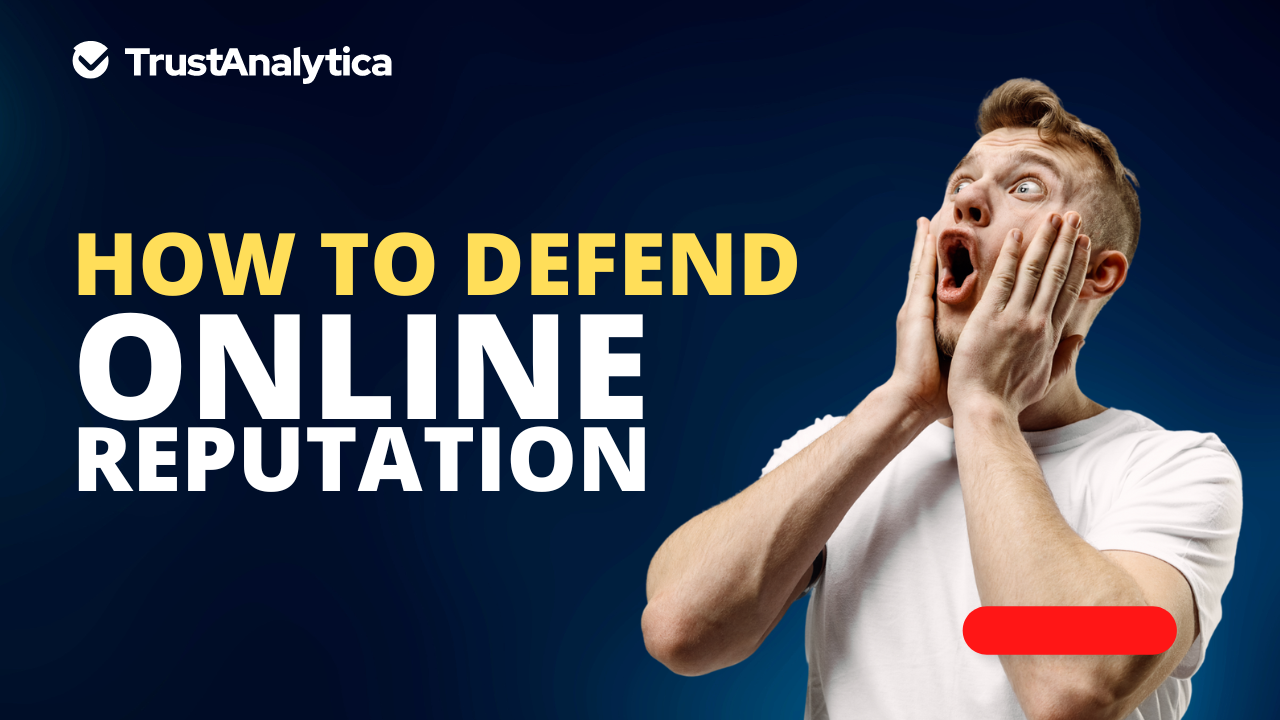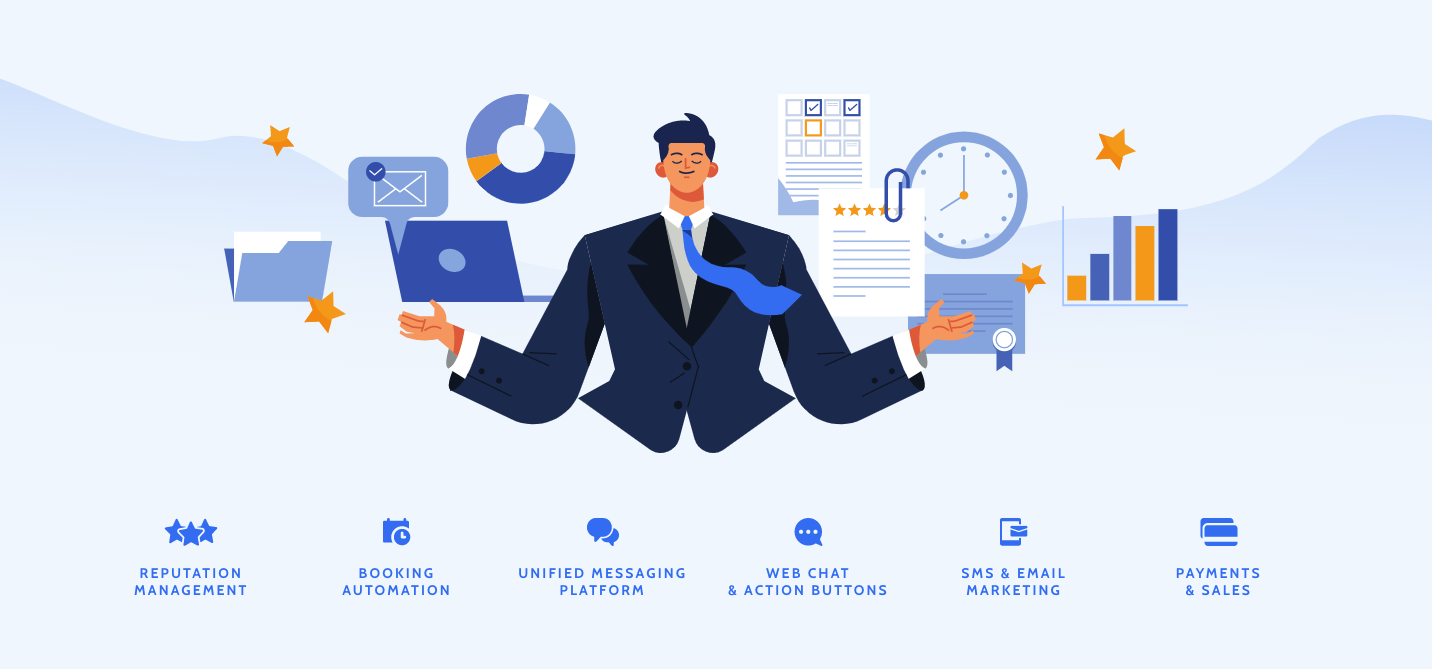In this modern search-happy world a company’s reputation is its most valuable asset. Caring for everything else and not caring to maintain or improve your company’s online reputation negatively impacts revenues. Defending, protecting, or improving a company’s reputation is a not one-day or two days task, it’s an ongoing process and there is no silver […]

In this modern search-happy world a company’s reputation is its most valuable asset. Caring for everything else and not caring to maintain or improve your company’s online reputation negatively impacts revenues. Defending, protecting, or improving a company’s reputation is a not one-day or two days task, it’s an ongoing process and there is no silver bullet.
Remember that the reputation of a business is subjective and it’s entirely based on the general public’s perception of your business. A study suggests that reputational risk and bad publicity directly affect a company’s revenue-generating abilities. A company’s brand image and reputation directly influence the behavior of consumers, employees, regulators, and investors.
Bad actors and demoters can quickly harm a company’s reputation because the general public is always more interested in negative news than positive ones. According to a study published by Dell Inc, a demoter or an online detractor costs them more as compared to a brand promoter.
Therefore being proactive about defending and protecting online reputation of your business and taking assistance from some advanced AI-based online reputation management tool is absolutely necessary. In this article, we will share expert tips on how to protect online reputation of your business and what tools can assist you in this.
Online reputation refers to how a brand identifies itself online and how the general public perceives it online. It’s the consensus public opinion about an individual or an organization based on their online presence. The general online reputation is directly dependent upon the behavior of that organization and is based on the subjective thoughts of all observers and customers.

An online business with a good overall reputation is more likely to attract new customers as compared to a business that pays little to no attention to its brand image. People often think of reputation and branding as two entirely similar things, but they aren’t similar. Yes, they are the two sides of the same coin but there are some differences as well. Branding can be achieved through effective paid marketing but reputation takes years of consistent effort. Constant branding and maintaining a brand’s image for a long time leads to a good reputation.
An online brand is only as good as its online reputation. Before any customer decides to do business with your company, they are going to Google it first. No matter you like it or not but online reputation management (ORM) has become essential for the survival of a business in this competitive world.
Based on the famous quote “The one thing they love more than a hero is to see a hero fall”. The general public is merciless and life isn’t fair. No matter what you have done for your customers (promotional discounts, giveaways, bearing losses to deliver better quality) the general public will love to pounce on the next fake news with zero concern about its authenticity and destroy your brand’s image if given the opportunity.
Therefore taking your company’s online reputation protection very seriously and taking a proactive approach to maintaining it is absolutely necessary. Online reputation management is essential as it allows business owners to take informed decisions before something tragic hurts their company’s reputation.

Getting assistance from an advanced AI-based reputation management tool like Trust Analytica is by far the most important step a company should take toward maintaining or improving its online reputation.

Unified messaging, chat integrations, booking automation, brand mentions tracking, marketing assistance, sales management you name it, Trust Analytica has got it all.
Trust Analytica helps you keep track of all your brand mentions and lets you actively take part in active conversations regarding your business. Not just that, the unified messaging platform enables you to read and respond to chats from the whole internet through one platform along with many more benefits as well.
Securing all your login details and keeping an eye on who has access to your websites and social media platforms is essential to protect reputation of your business. This helps prevent a data breach thus preventing unauthorized access to your company’s personal data.
Ask all your employees who represent your organization to google themselves and remove any controversial information that appears on the first page of Google. Any controversial political or religious opinion that could scare off potential customers or investors should be removed as it can negatively impact the company’s reputation.
Remember that the first step to branding is to register your brand logo and name online. Brand mention tools or google alerts about the mention of your brand will only work effectively if you have already done this. Doing this also eliminates the probability of some fake business with a similar name or domain affecting your business’s online reputation.
Creating google alerts to keep track of online brand mentions can save you from the hassle of looking at Yelp, Twitter, Facebook, Google reviews, Angie’s List, local news sites, Next Door, and blogs all by yourself. However, Google Alerts are still not as effective or efficient as compared to TrustAnalytica which is solely built for reputation management.
By far the most credible source of online reputation, Google reviews, Yelp reviews, Facebook reviews, and other social media platform reviews can either make or break a company’s online reputation. Getting more and more reviews is essential to boosting your business’s online reputation.
Review sites are often a place for your brand’s most frustrated customers to vent. Most of the time only the people with a bad experience take the time to post negative feedback as a revenge tactic.
According to a recent study, a consumer is 21% more likely to leave a review after a bad experience. Online reputation management tools like Trust Analytica help encourage every customer either with a positive or negative experience to give feedback about their experience. This way the overall review rating of the business increases, contributing to the business’s success.
It is your job to identify active conversations about your business and respond to the negative ones ASAP. You are responsible to find and root out those vocal customers who are so upset about your business that they want to tell the whole world about their experience.
As soon as you find someone posting negative comments about your business ask them or try to discover what went wrong. Be willing to correct your mistake and do everything in your power to fix the issues being faced by the customer. Doing this would most probably turn a 1-star review into a 5-star review in no time.

A strong online presence is a gateway to strong branding and hence a strong reputation. Quickly responding to mentions and reviews does help a lot in leaving a strong footprint on your brand’s priorities.
A unified messaging tool like Trust Analytica can help you quickly respond to all direct chats from all the different platforms by combining all chats on one user-friendly interface. It also helps you move chats from the public domain to private chats by using Ai-based brand mention techniques.
Set proper guidelines for staff members and social media managers on what you expect from them, what they can or can’t say, and how they are supposed to respond. Also, give regular reminders to them about company policies.
Dont solely rely on social media managers to keep track of everything happening on social media as it can be a hectic task. Encourage everyone (employees, stakeholders, suppliers, customers) to report anything they see online that is affecting the company’s reputation.
Here are some expert suggestions for different types of monitoring:
All reputational risks do not come from just your customers or end-users. Many risks could also arise from outside your organization, mostly unethical partners, suppliers, agents, and contractors. Being mindful of these risks can save your business from the shame of being trialed publicly on some web forum or a social media platform.
As mentioned earlier on how Domino’s Pizza found out the importance of brand mentions the hard way, you must be proactive about what is being said about your business. Create accounts across all the social media platforms where possible and not just where your marketers prefer. Once you are done creating your online presence everywhere, just integrate all these platforms into a dedicated presence.
Trust Analytica features the best unified messaging platform that enables business owners to view and respond to all social media messages and web texts/mentions across different platforms through one unified messaging platform
If you get it wrong once then dont get it wrong twice. Always learn what went wrong and list loopholes that allowed the breaches. Take note of your mistake and take measures to never let them happen again.
Always have transparent workplace practices that are written in detail in the contract and signed by all employees before they join your company. See if there is any discrimination in your organization against a specific race, caste, or color.
Also, monitor if your social media managers are biased against people of some specific country or people with different political or religious views. Quickly respond to these problems before they start to snowball.
Plan in advance how you are going to respond to negative comments, complaints, and reputation bombs. Avoid knee-jerk reactions or deciding after seeing a negative review pop out.
Know when to involve the authorities and dont try to be nice to people who break the law. Report online threats and hate speech cases to concerned authorities. Remember that it’s not always the seller’s fault and know when to take a stand for your employees.
Posting feedback about false information on your social media posts or stories can also stop false information from spreading any further.
Yes, online reputation protection is absolutely necessary for any business. Remember that an online business is only as good as its reputation, not caring for your business reputation can result in reduced revenue and negative business sentiment.
It is important to protect your online reputation as it directly impacts the decision-making of more than 80% of customers who shop online. No one likes to do business with a company that has a lot of negative reviews.
Online reviews, customer feedback on social media platforms, brand mentions, and online reputation tracking are the most important aspects of managing the online reputation of your business.
Online reputation marketing refers to tactics and strategies that are related to presenting your brand to the people in the best possible way at all times.
Online reviews management, business sentiment analysis, keeping track of brand mentions, and having a proactive reputation management strategy are some important aspects of protecting your digital reputation and identity online.
Getting more reviews, keeping an eye on brand mentions, building a social media presence, taking an active part in conversations about your business, and taking a proactive approach toward negative customer experiences are some steps that can help you protect online reputation of your business.

